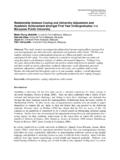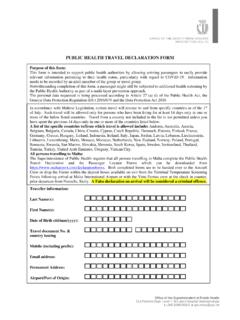Transcription of Characteristics of the Maltese Entrepreneur
1 International Journal of Arts and Sciences 3( 7): 292 - 312 (2010 ) CD-ROM. ISSN: 1944-6934 Characteristics of the Maltese Entrepreneur Frank Bezzina, University of Malta, Malta Abstract: This empirical study which is based in Malta seeks to characterize the personality/psychological profile of Maltese entrepreneurs (business owners and self-employed persons) and employed managers. The Characteristics investigated in this study are the need for achievement, locus of control, tolerance towards ambiguity, self-confidence, creativity/innovativeness, risk-taking propensity and self-sufficiency/freedom. It also attempts to determine which of these Characteristics can adequately distinguish between entrepreneurs and managers. Sixty entrepreneurs and sixty managers, selected by using a combination of purposive and quota sampling techniques, participated in the study by completing the Entrepreneurial Characteristics Questionnaire, which was purposely designed for the present study.
2 Results showed that entrepreneurs have a greater need for achievement, more self-sufficiency/freedom, more self-confidence, a higher tolerance for ambiguity, more creativity/innovativeness, more internal locus of control and a higher propensity to take risks. However, the two Characteristics that adequately distinguished between entrepreneurs and managers in this study were self-sufficiency and internal locus of control. In other words, Maltese entrepreneurs are more likely to prefer to be their own boss and to take decisions independently and believe more strongly than managers that they can influence events with their decisions. Additionally, binary logistic regression revealed that self-sufficiency is the most important predictor in classifying a person s occupation as that of an Entrepreneur or a manager, with an overall holdout accuracy of The implications of the findings are discussed. Keywords: Entrepreneurship, Entrepreneurial Profile, Personality/Psychological Characteristics , Malta.
3 Introduction In the Entrepreneurship Survey of the EU 25 conducted by the Gallup Organisation Hungary (Flash Eurobarometer 192, 2007), Malta attained a relatively low score for entrepreneurial activity and this translated into a relatively low rating for Malta on the entrepreneurial index climate. In fact, the Maltese index was below the average standard obtained by the 25 EU member states. At the same time, Malta was characterised as having a very low rate of business failure and business transfer. Additionally, although in most countries a low rate of entrepreneurial activity is generally associated with a low preference for self-employment, the survey shows that this is not the case for Malta, as half of the Maltese respondents claimed that they would prefer to be self-employed. So, if we want the entrepreneurial spirit in Malta to flourish, we need to understand the factors that promote it and then we need to find effective ways of encouraging the growth of new business formations in order to stimulate economic growth and wealth creation.
4 International Journal of Arts and Sciences 3( 7): 292 - 312 (2010 ) CD-ROM. ISSN: 1944-6934 A recent document published by the Central Bank of Malta (April 15, 2010) reports that entrepreneurial activity, particularly that of small businesses and of self-employed individuals, has undoubtedly contributed to the resilience shown by the Maltese economy during the recent recession and that entrepreneurial activity is the key for Malta to sustain the recovery and maintain its competitiveness Given the growing importance on entrepreneurship and the lack of empirical research in Malta on entrepreneurial profiles, this study seeks to characterise the entrepreneurial profile of Maltese entrepreneurs (company owners and self-employed persons) and employed managers. It also attempts to determine which of these Characteristics can adequately distinguish between the Entrepreneur and the employed manager. The implications of the findings together with avenues for future research will be discussed.
5 Literature review Defining entrepreneurship Entrepreneurship is the process by which opportunities to create future goods and services are discovered, explored and evaluated (Shane & Venkataraman, 2000, p. 218). This definition has been chosen because it does not restrict the term Entrepreneur exclusively to founders. Whilst giving high prominence to the firm founder and the degree of creativity involved in entrepreneurship (cf. Shane, Locke & Collins, 2003), it views other persons such as small business owners and self-employed persons as entrepreneurs and so this definition seems more fitting for the Maltese context. In fact, it has been argued that the field of small business is very closely tied to entrepreneurship since the entrepreneurship recognises the importance of the manager, who in most cases is the owner (cf. Hisrich & Dronvsek, 2002). After all, the importance of small businesses emerged in Europe after the publication of the Bolton Report (1971), which reported the economic importance of small firms.
6 This led to a substantial increase in small businesses in Europe as well as educational programmes and initiatives aimed at promoting small business and entrepreneurship. Schools of entrepreneurship According to Cunningham & Lischeron (1991), research activities on entrepreneurship fall under six main schools of thought. 1. The great person school of entrepreneurship, which deals with the notion of whether entrepreneurs are born or made and where successful entrepreneurs are characterized as individuals who are have strong drives for independence and success, have high levels of vigour, persistence and self-esteem. 2. The psychological Characteristics school of entrepreneurship focuses on personality factors and considers entrepreneurs to have unique needs, drives, attitudes, beliefs and values which determine their behaviour and which distinguishes them from non- entrepreneurs . International Journal of Arts and Sciences 3( 7): 292 - 312 (2010 ) CD-ROM.
7 ISSN: 1944-6934 3. The classical school of entrepreneurship distinguishes between entrepreneurship and management and identifies innovation, creativity and discovery as the key aspects of entrepreneurship. 4. The management school of entrepreneurship deals with the technical aspects of management by focusing on the central functions required in managing a firm organizing and managing, and assuming risk for the sake of profit. This school of though is based on the belief that entrepreneurship can be developed and taught in a classroom. 5. The leadership school of entrepreneurship views the Entrepreneur as a people manager or an effective leader/mentor whose key functions are to motivate, direct and lead. 6. The intrapreneurship school evolved in response to lack of innovativeness and competitiveness within organisations. An intrapreneur is not an owner but focuses strategic redirection, organizational duplication, product development, and operational efficiency.
8 The emphasis is working together as a team to solve problems and create opportunities. According to Cunningham & Lischeron (1991), to say that one school of thought is better than the other is like saying that one religion is more godly than another. The selection depends on the information the researcher wants to emphasize when focusing on a specific aspect of the entrepreneurial process. Since the aim of this study was to determine those Characteristics and attitudes that can adequately distinguish between entrepreneurs and employed managers in Malta, the psychological and great person schools of entrepreneurship were the most appropriate to address the research aims of this study. Personality/psychological Characteristics Although no one has yet found the perfect entrepreneurial profile, certain Characteristics and attitudes show up repeatedly when analyzing an Entrepreneur s personality (Gasse & Tremblay, 2009).
9 Studies have identified numerous personality/psychological Characteristics that are unique to entrepreneurs (vis-a- vis non- entrepreneurs ). Such Characteristics that have received particular attention in the entrepreneurial literature are: the need for achievement, locus of control, ambiguity tolerance, self-confidence, creativity/innovation, risk-taking propensity and self-sufficiency/freedom. These will be discussed in further detail below. Need for achievement McClelland s (1961) theory of the need for achievement proposes that individuals who have a need to achieve seek to excel, progress and perform. Such individuals set high but obtainable targets and strive to attain them through their own efforts, are more concerned with the personal achievement rather than with the rewards of success, need regular feedback to monitor their progress of achievement and generally prefer to work alone or with other high achievers. This theory suggests that individuals that have a high need of achievement are more likely to seek out an entrepreneurial job rather than other roles.
10 In fact, many studies have shown that entrepreneurs have a higher need for achievement than non- entrepreneurs (Robinson et al., 1991; Steward et al., 2003) and that entrepreneurially inclined persons have a greater need for achievement than those who are not entrepreneurially inclined (G rol & Atsan, 2006). However, it has also been reported that this characteristic is not as effective in making the difference between firm founders and International Journal of Arts and Sciences 3( 7): 292 - 312 (2010 ) CD-ROM. ISSN: 1944-6934 managers but could be helpful in determining entrepreneurial activity (Collins, Locke & Hanges, 2000). So the first null hypothesis tested in the study is: H1: entrepreneurs and managers have the same level of the need for achievement. Locus of control According to Rotter (1966), there are two aspects of locus of control: internal and external. Internal control expectations occur when an individual has got direct control over his life and when the outcome of his actions depends on his own performance or Characteristics .








